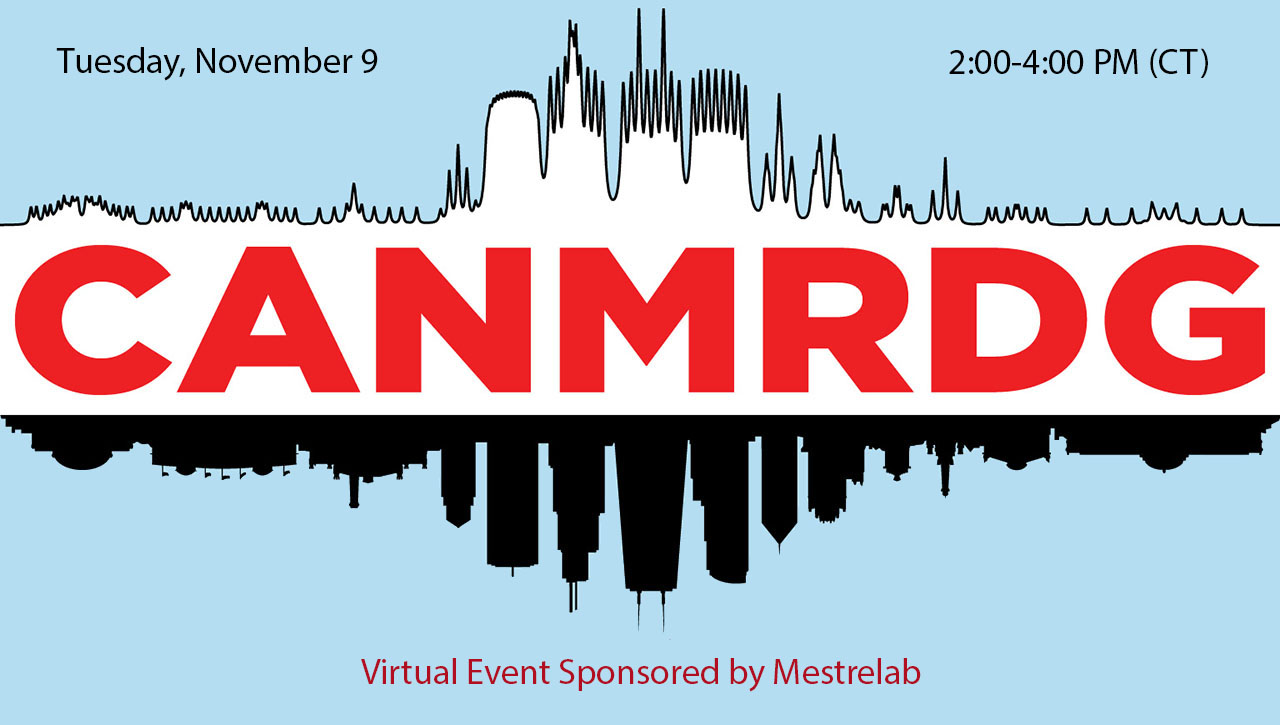CANMRDG Virtual Meeting
Join the third day of this CANMRGD virtual event!
THIS EVENT HAS EXPIRED!
Chicago Area NMR Discussion Group (CANMRDG) is a collection of talks about NMR featuring keynote speakers and local spectroscopists.
Mestrelab is proud to sponsor this 2-hour virtual session (third one out of four) opening the session with this talk “Mnova NMR Applications For Quantitative Analysis”
You can find the agenda for the four-day sessions here 2021_CANMRDG_speakers_titles
Register for our Users’ Meeting! Sunday, October 17
The validation workshop will also be rescheduled to October 22nd.
You can check here PANIC Validation workshop’s agenda.
FULL AGENDA – November 9, 2pm – 4pm (CT)
| Time | Speaker |
|---|---|
| 2:00 – 2:05 | Session Chair Opening Remarks Josh Kurutz, PhD University of Chicago |
| 2:05 – 2:25 | Sponsor remarks: Mnova NMR Applications For Quantitative Analysis Mark Dixon, PhD Mestrelab Research |
| 2:25 – 2:55 | Keynote: Insights into the Development of NMR Interpretation Ability Ginger Shultz, PhD University of Michigan |
| 2:55 – 3:15 | Enabling Novel Electrolytes for Next Generation Lithium Metal Batteries Chibueze Amanchukwu, PhD University of Chicago |
| 3:15 – 3:35 | Monitoring Reaction Progress for the Detoxification of Chemical Warfare Agents Using 31P NMR Unjila Afrin, PhD AbbVie |
| 3:35 – 3:55 | Determining the Number of Threaded Rings on Mechanically Interlocked Polymers Using qNMR Yunyan Qiu, PhD Northwestern University |
| 3:55 – 4:00 | Session Chair Closing Remarks |
TITLE:
Insights Into The Development of NMR Interpretation Ability
ABSTRACT:
Most curriculum for teaching NMR spectroscopy draws on idealized spectra and does not fully engage learners with authentic data analysis. To better understand how chemists learn to interpret spectra, we investigated the development of NMR interpretation ability when participants responded to tasks that better resemble actual practices of professional chemists. We monitored undergraduate and graduate students as they evaluated the success of chemical syntheses through IR and 1H NMR spectral interpretation. Participants completed a series of interpretation tasks while having their eye movements tracked and then participated in semi-structured, cued retrospective think-aloud interviews about their reasoning during spectral interpretation. These interviews were analyzed qualitatively to characterize chemical assumptions and heuristic reasoning strategies used by participants. Undergraduate participants exhibited uninformed bidirectional processing of all information, whereas doctoral participants exhibited informed unidirectional processing of relevant information. These findings imply that the community can support novices’ development of expertise by encouraging informed interpretation strategies, including the preliminary evaluation of relevant variables, prediction of expected spectral features, and search for complementary data across spectra.
Bio Profile: https://lsa.umich.edu/chem/people/faculty/gshultz.html

